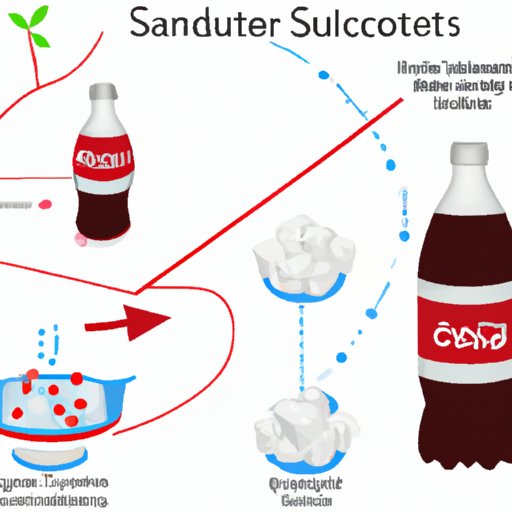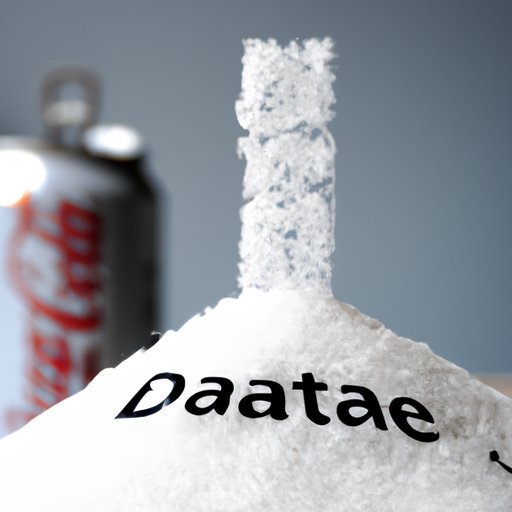Introduction
Coca-Cola is one of the most popular soft drinks in the world, and it comes in two varieties: regular and diet. The main difference between the two is that regular Coke contains sugar, while diet Coke contains artificial sweeteners. But what exactly are these artificial sweeteners, and how do they affect the taste and health of Diet Coke? In this article, we’ll explore the sweeteners used in Diet Coke, how artificial sweeteners are formulated to sweeten Diet Coke, the taste differences between regular and Diet Coke, and the potential health impacts of sweetening Diet Coke.
Exploring the Sweeteners Used in Diet Coke
The primary difference between regular and diet Coke lies in their respective sweeteners. Regular Coke contains sugar, while diet Coke contains artificial sweeteners such as aspartame, acesulfame potassium, sucralose, and neotame. Aspartame, in particular, has been used in diet sodas since 1983 and is the most commonly used artificial sweetener in Diet Coke.
According to an article published by the American Chemical Society, aspartame is about 200 times sweeter than sugar, so only a very small amount is needed to sweeten a can of Diet Coke. This means that a single can of Diet Coke contains less than one calorie, compared to 39 calories in a can of regular Coke. Additionally, aspartame has a longer shelf life than sugar, meaning it doesn’t need to be replaced as often.

How Artificial Sweeteners are Formulated to Sweeten Diet Coke
Artificial sweeteners are synthesized compounds designed to mimic the sweetness of sugar without adding calories. These compounds are typically made up of chemicals such as aspartic acid, phenylalanine, and methanol. They are then blended with other ingredients, such as preservatives and flavorings, to create a syrup that is added to Diet Coke.
The advantage of using artificial sweeteners is that they can provide the same level of sweetness as sugar without the calories. However, some experts believe that the long-term use of artificial sweeteners may be associated with health risks, such as obesity, diabetes, and even cancer. For this reason, some companies are turning to natural sweeteners, such as stevia and monk fruit, as alternatives to artificial sweeteners.

Examining the Taste Differences Between Diet and Regular Coke
Taste is subjective, but there are a few factors that can influence how a person perceives the taste of Diet Coke. One factor is the type of sweetener used; for example, aspartame is known to have a bitter aftertaste, which some people find unpleasant. Additionally, artificial sweeteners tend to lack the complexity of natural sweeteners, which can also affect the taste. Lastly, the levels of carbonation and acidity in Diet Coke can also influence the taste.
In a study conducted by the University of South Carolina, participants were asked to compare the taste of regular Coke and Diet Coke. The results showed that participants generally preferred the taste of regular Coke over Diet Coke, citing a lack of sweetness and a “chemical taste” as the main reasons for their preference. This suggests that artificial sweeteners may not be able to replicate the complex flavor of regular Coke.

Understanding the Health Impacts of Sweetening Diet Coke
While there is no scientific evidence to suggest that artificial sweeteners are dangerous, there are still potential risks associated with their use. For example, a study conducted by the Harvard School of Public Health found that people who drink more than one Diet Coke per day had a higher risk of stroke and heart attack than those who did not drink any. Additionally, artificial sweeteners have been linked to increased cravings for sugary foods, which can lead to weight gain.
On the other hand, natural sweeteners, such as stevia and monk fruit, have been shown to have fewer health risks than artificial sweeteners. These natural sweeteners are derived from plants, so they don’t contain any of the chemicals found in artificial sweeteners. Additionally, they are much lower in calories than sugar, so they can help reduce calorie intake without sacrificing sweetness.
Conclusion
In conclusion, Diet Coke contains artificial sweeteners such as aspartame to sweeten the beverage without adding calories. These sweeteners are formulated to provide the same level of sweetness as sugar, but some people may find the taste lacking or unpleasant. Additionally, there are potential health risks associated with the use of artificial sweeteners, so some companies are turning to natural sweeteners, such as stevia and monk fruit, as alternatives.
Overall, understanding the sweeteners used in Diet Coke can help us make informed decisions when choosing between regular and diet drinks. While artificial sweeteners may provide the same level of sweetness, natural sweeteners may be a healthier option due to their lower calorie content and lack of chemicals.
(Note: Is this article not meeting your expectations? Do you have knowledge or insights to share? Unlock new opportunities and expand your reach by joining our authors team. Click Registration to join us and share your expertise with our readers.)
